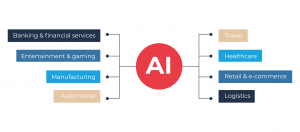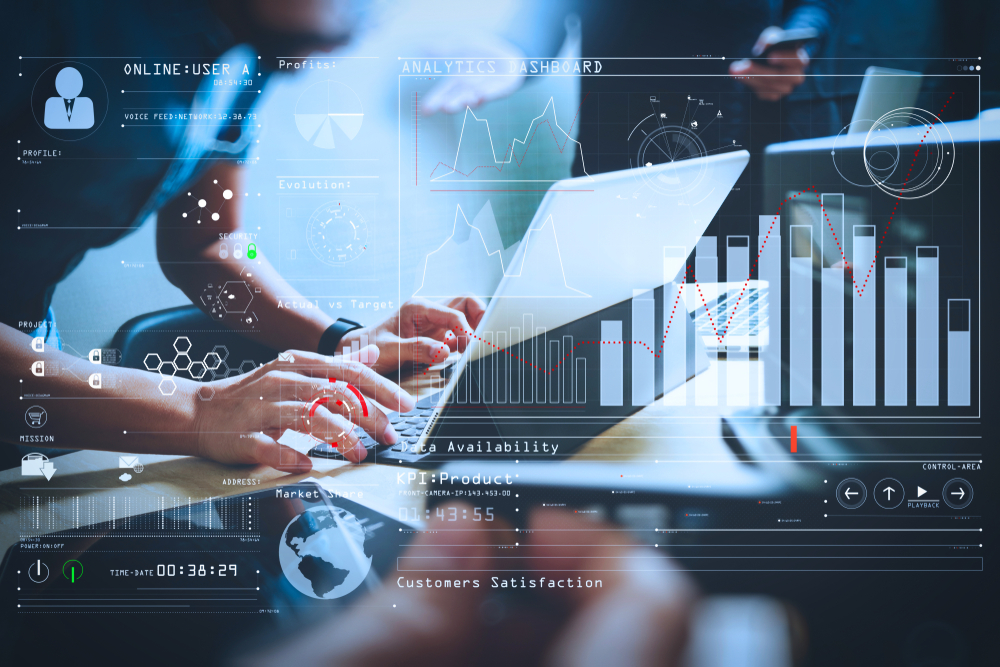AI’s innovations have advanced the world of business across many industries, expanding the possibilities for how companies approach real-time engagement with their customers, manage their operations, and ensure business continuity, especially through the pandemic. As the technology advances, businesses are finding new ways to leverage AI in their innovation and expansion plans. According to Statista, the global AI market is predicted to snowball in the next few years, reaching a USD 190.61 billion market value in 2025.
In this blog, we’re tying together many of our recent posts to explore how major industries leverage AI to optimize business operations, improve customer experience, and increase revenue, among other benefits.
AI Applications in Healthcare
The healthcare industry has significantly benefited from AI after being hurt by poor processes and rising costs. According to Grandview Research, the global AI in healthcare market was valued at USD 10.4 billion in 2021 and is expected to reach USD 208.2 billion by 2030.
AI technology is applied for many healthcare services, including safeguarding private records, data mining for identifying patterns, more accurate diagnosis, robot-assisted surgeries, medical imaging, medication management, drug discovery, and more.
Check out our recent blog, which explores the exciting AI developments that are already underway and expected to be embraced heavily in the healthcare sector, including:
- Optimized efficiency in healthcare administration & management
- Refined telehealth solutions
- Personal health monitoring with wearables and other devices
- Robot-assisted surgeries
AI Applications in Travel
According to Statista, the AI in travel market was valued at USD 297 billion in 2020 and is expected to reach USD 950 billion by 2030. In the travel industry, AI can improve personalization, tailor recommendations, and guarantee fast response times, even without staff. Furthermore, machine learning and predictive analytics can help travel companies boost their conversion rates by identifying customer behavior and purchasing patterns.
AI Applications in Retail & E-commerce
Most end-users in the e-commerce space have interacted with AI in their customer journey at least once. One Statista report shows that the global market for AI in retail was valued at about USD 3 billion in 2019 and is estimated to grow exponentially, reaching USD 23.32 billion by 2027.
Being a highly competitive space, retail businesses quickly leverage AI technologies to find patterns in consumer behavior and align their strategy to outsmart their competitors. In our recent blog, we highlight the key areas to focus on to stay at the top of the AI game and boost retail performance, including:
- AI-powered retail personalization
- Predictive analysis for supply chain management
- Alternative ways to search
- Cashierless shopping
- Customizable products
AI Applications in Logistics
For logistics operations, AI has been a game-changer. A report by McKinsey predicts that AI will create an entirely new “logistics paradigm” by 2030 as it continues to outperform humans at repetitive but mission-critical tasks. The use of machine learning and predictive analytics has already transformed supply chain management, making it a seamless process. Many warehouses use AI-powered robots for sorting and packaging products in warehouses. Furthermore, AI algorithms are also increasingly used to find the shortest shipment route and support last-mile delivery.
AI Applications in Banking & Financial Services
The Banking and Financial Services industry is undergoing a tremendous transformation as it leverages the many applications of AI. A report by Allied Market Research showed that the global AI in banking market was valued at USD 3.88 billion in 2020 and is projected to reach USD 64.03 billion by 2030.
The critical factors driving the financial sector are real-time data reporting, accuracy, and data processing in large volumes. AI is perfect for these jobs, which is why the finance sector is implementing machine learning, adaptive intelligence, chatbots, and automation in their financial processes, ultimately improving customer satisfaction.
AI Applications in Entertainment & Gaming
According to Grandview Research, the global AI in media & entertainment market was valued at USD 10.87 billion in 2021 and is estimated to grow at a compound annual growth rate (CAGR) of 26.9% from 2022 to 2030. In the entertainment industry, AI is helping entertainment companies like Netflix and HBO provide more personalized service and improve customer experience by identifying which shows or programs to recommend to individual users based on their activity.
The gaming industry was one of the early adopters of AI, and its impact on the user experience has been profound. Among several applications in gaming, AI is used to control the actions of non-player characters (NPC) that play a role in advancing the game’s storyline in a specific direction. AI-driven behavior modeling of such characters greatly enhances the gamer’s experience in the overall storyline.
AI Applications in Automotive
Global Market Insights reported that the AI in automotive market size exceeded USD 1 billion in 2019 and is estimated to grow at over 35% CAGR between 2020 and 2026, reaching USD 12 billion. AI is utilized in numerous ways in the automotive industry, from product development and customization to optimizing the in-vehicle experience. AI is fueling a new generation of smarter cars, making self-driving vehicles the next big thing. Although they are still in the research and trial stage in many countries, AI-based self-driving will potentially replace manual driving and make roads safer.
Our recent blog explores how auto manufacturers are taking advantage of AI, the financial benefits of leveraging AI in the auto sector, how AI is improving the in-vehicle experience, and some predictions for the future of AI in the automotive industry. Check it out.
AI Applications in Manufacturing
In manufacturing, AI is employed across several operation lines, from workforce planning to product design, improving efficiency, product quality, and employee safety. A Deloitte survey showed that the market size of AI in the manufacturing sector is expected to exceed USD 2 billion by 2025, an average annual growth of more than 40% from 2019.
For example, in factories, machine learning is utilized to support the predictive maintenance of critical industrial equipment, helping management take timely measures to restore the equipment and prevent costly unplanned downtime.
In Conclusion
As you can see, businesses across various industries can leverage AI to reap many benefits, including reduced operational costs, increased efficiency, revenue growth, and improved customer experience. For the greatest benefits, organizations should look at utilizing the full range of smart technologies, including machine learning, natural language processing, and more, in their processes and products. However, even businesses that are new to AI can reap major rewards.
Check out our recent guide to AI technologies, where we go deeper to explore some key technologies driving innovation in AI and provide an enterprise-ready ranking to drive your adoption strategy.
To learn more about Wizeline’s AI offerings, visit our Intelligence Everywhere page or contact us at consulting@wizeline.com to get started.






